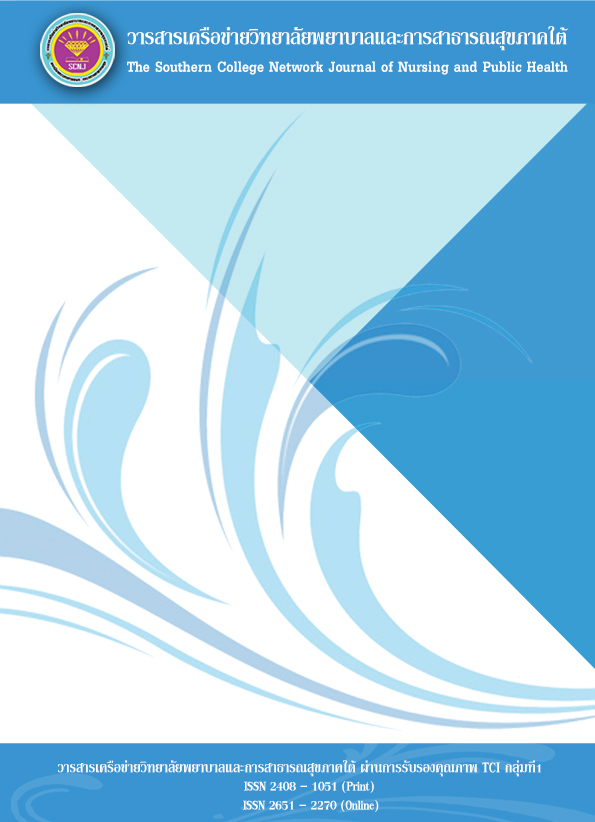ศักยภาพด้านความรู้ เจตคติ และการปฏิบัติของผู้นำศาสนาอิสลามในการแก้ปัญหา ภาวะโลหิตจางในหญิงตั้งครรภ์มุสลิมชายแดนใต้
คำสำคัญ:
ศักยภาพ, ผู้นำศาสนาอิสลาม, ภาวะโลหิตจาง, หญิงตั้งครรภ์มุสลิมบทคัดย่อ
การวิจัยเชิงพรรณนานี้ เพื่อศึกษาศักยภาพด้านความรู้ เจตคติ และการปฏิบัติในการแก้ปัญหาภาวะโลหิตจางในหญิงตั้งครรภ์มุสลิมชายแดนใต้ของผู้นำศาสนาอิสลาม กลุ่มตัวอย่างคือ ผู้นำศาสนาอิสลามที่เป็นโต๊ะอิหม่าม จังหวัดนราธิวาส จำนวน 248 คน สุ่มตัวอย่างด้วยการกำหนดขนาดกลุ่มตัวอย่างอย่างง่าย เก็บข้อมูลโดยใช้แบบสอบถามประกอบด้วย 2 ส่วน คือ 1) แบบสอบถามข้อมูลทั่วไป 2) แบบสอบถามศักยภาพของผู้นำศาสนาอิสลามในการแก้ปัญหาภาวะโลหิตจางในหญิงตั้งครรภ์มุสลิมชายแดนใต้ ด้านความรู้ ด้านเจตคติ และด้านการปฏิบัติ ซึ่งผ่านการตรวจสอบความตรงได้ค่า CVI เท่ากับ 1 ได้ค่าความเที่ยงค่าสัมประสิทธิ์แอลฟ่าของครอนบาคได้ค่าเท่ากับ .81 วิเคราะห์ข้อมูลโดยใช้สถิติพรรณนาและข้อเสนอแนะทำการวิเคราะห์จัดกลุ่มเนื้อหาของข้อมูลผลการวิจัยพบว่า
กลุ่มตัวอย่างส่วนใหญ่มีศักยภาพด้านความรู้และเจตคติในการแก้ปัญหาภาวะโลหิตจางในหญิงตั้งครรภ์มุสลิมชายแดนใต้ ในภาพรวมอยู่ในระดับปานกลาง (M=3.17, SD=1.08) ประกอบด้วย ด้านเจตคติมีคะแนนเฉลี่ยมากที่สุด (M=3.23, SD=1.02) ด้านความรู้มีคะแนนเฉลี่ยน้อยที่สุด (M=3.11, SD=1.03) ส่วนด้านการปฏิบัติพบว่า กลุ่มตัวอย่างร้อยละ 94.35 ไม่เคยให้คำแนะนำหรือเป็นที่ปรึกษา ร้อยละ 91.94 ไม่เคยให้ความร่วมมือกับเจ้าหน้าที่ และร้อยละ 64.92 ไม่ต้องการเข้ารับการอบรมจากคณะกรรมการอิสลาม ดังนั้น บุคลากรทางสุขภาพควรสร้างความตระหนักแก่ผู้นำศาสนาอิสลามเกี่ยวกับผลกระทบของภาวะโลหิตจางขณะตั้งครรภ์ โดยการให้ความรู้หรืออบรมแก่ผู้นำศาสนา แล้วจึงเปิดโอกาสให้ผู้นำศาสนาอิสลามมาร่วมทำงานในทีมสุขภาพของชุมชน ในการจัดการปัญหาและมีส่วนร่วมในการสนับสนุนในการแก้ไขปัญหาภาวะโลหิตจางขณะตั้งครรภ์ เพื่อการแก้ไขปัญหาที่มีประสิทธิภาพและยั่งยืนต่อไป
เอกสารอ้างอิง
Department of Religious Affairs, Ministry of Culture. (2010). Conclusion of the Project on Training and Development of Religious Personnel.The Capacity Building Program for Imam and Mosque Executives. Bangkok: Agricultural Cooperative Federation of Thailand. (in Thai)
Department of health. (2017). Maternal and Child Health Division. Retrieved May 15, 2017 from http://thaipublica.org/2017/04/maternal-and-child-health-situation-in-three-southernmost-provinces/.
Hanvattanakul, C. (2004). Using folk Wisdom for Promoting Health During Pregnancy: A Case Study Southern Thai Muslim women. Faculty of Nursing Science, Prince of Songkla University. (in Thai)
Hiranto. A. (2005). Muslim in Thailand. Bangkok: Rungruangrut Printing.
Jehnok, M. (2012). The Effect of Supportive Education Program for Reduction of Anemia on Self-Care Behavior of Muslim Pregnant Women. Faculty of Nursing Science (Midwifery), Prince of Songkla University. (in Thai)
Jitmouk, S. (1992). Islamic Culture. Bangkok: The Way Forward.
Krejcie, R. V., & Morgan, D. W. (1970). Determining Sample Size for Research Activities. Educational and Psychological Measurement, 30(3), 607-610.
Lohaus, D., & Kleinmann, M. (2002). Analysis of Performance Potential, In Sonnentag (ed), Psychological Management of Individual Performance, John Wiley & Sons, Ltd, New York.
Pinchaleaw, D. (2017). Nurses and Management of Iron Deficiency Anemia in Pregnant Women. Nontabury. Sukhothai Thammathirat Open University. (in Thai)
Promtongboon, S. (2012). The Effect of Mutual Goal-Setting Oriented Program on Self-Care Behaviors and Hematocrit among Pregnant Women with Iron Deficiency Anemia. Faculty of Nursing Science (Midwifery), Prince of Songkla University. (in Thai)
Roungrit, R., Malathum, P., & Prapaipanit, W. (2012). Perception Towards Fasting and Self Care Behaviors of Thai Muslims with Type 2 Diabetes Mellitus during the Fasting Month of Ramadan, Bangkok: Ramathibodi School of Nursing, Faculty of Medicine Ramathibodi Hospital, Mahidol University. (in Thai)
Rongsak, S., Poolpat, P., & Rukkiat, M. (2017) Anemia in Pregnant Woman at Nopparatrajathanee Hospital. Journal of Nursing and Health Care. Patumtanee: School of Nursing, Rangsit University. (in Thai)
Schunk, Dale. H. (2012). Learning Theories: An Educational Perspective ( 6th ed.). New Jersey: Pearson Education.
Sookdee, J., & Wanaratwichit, C. (2016). Factors Affecting Iron Deficiency Anemia among Pregnant Women Receiving Antenatal Care at Sub-Districts Health Promoting Hospital. Phitsanulok: Faculty of Public Health, Naresuan University. (in Thai)
Sompaorat, A., Luevanich, C., & Lorlohakarn, S. (2011). Life Style of Muslim Diabetes Type 2 Patients in Ramadan and Non-Ramadan Months Takuatung District, Phang-Nga Province. Puket: Puket Rajabhat University. (in Thai)
Samusenito, A. (2016). Thai Muslims Family in Pattani During Demographic Transitions Stages. Pattani: Faculty of Humanities and Social Sciences, Prince of Songkla University Pattani. (in Thai)
Tohpa, S. (2015). The Effect of Nutritional Promotion Program Intergrating Islamic Principles on Eating and Iron Supplement-Taking Behavior Muslim Pregnant Women with Anemia. Faculty of Nursing Science (Midwifery), Prince of Songkla University. (in Thai)
Theppipit, W. (2004). Effect of an Exercise Program on Health Promotion among Older Thai Muslim in Muang District, Suratthani Province. Bangkok: Ramathibodi School of Nursing, Faculty of Medicine Ramathibodi Hospital, Mahidol University. (in Thai)
Timasen, M. (2010). Islamic teaching in the Womb. Bangkok: Ruan Kaew Printing.
Waealee, D. (2004). End-of-Life Care. According to Islamic Guidelines. Bangkok: The Chan Chuew Medical and Health Association.
ดาวน์โหลด
เผยแพร่แล้ว
ฉบับ
ประเภทบทความ
สัญญาอนุญาต
1. บทความหรือข้อคิดเห็นใด ๆ ที่ปรากฏในวารสารเครือข่าย วิทยาลัยพยาบาลและการสาธารณสุขภาคใต้ ที่เป็นวรรณกรรมของผู้เขียน บรรณาธิการหรือเครือข่ายวิทยาลัยพยาบาลและวิทยาลัยการสาธารณสุขภาคใต้ ไม่จำเป็นต้องเห็นด้วย
2. บทความที่ได้รับการตีพิมพ์ถือเป็นลิขสิทธิ์ของ วารสารเครือข่ายวิทยาลัยพยาบาลและการสาธารณสุขภาคใต้








